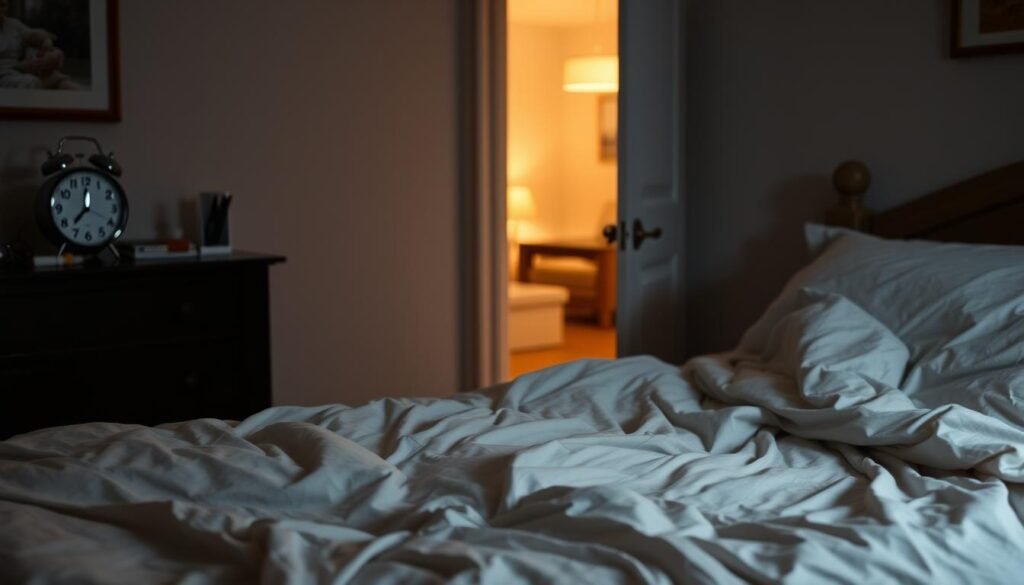Research shows that up to 35% of people with dementia have trouble sleeping. This can greatly affect their health. Sleep problems and worsening mental skills are closely linked. So, it’s key to understand how dementia and sleep issues are related.
Does dementia lead to insomnia? We’ll look into how dementia can change sleep and the common sleep problems those with dementia face. This sleep and memory guide offers helpful tips and ways to better sleep for those with dementia. It focuses on the important connection between dementia and insomnia.
Key Takeaways
- Insomnia affects 20%-35% of dementia patients, worsening cognitive challenges.
- There is a significant relationship between sleep problems and dementia progression.
- Sleep hygiene practices are essential for managing insomnia in dementia patients.
- Interventions, from lifestyle changes to medication, can improve sleep quality.
- Common sleep disturbances include REM behavior disorder and sundowning.
Understanding Dementia and Sleep
Dementia includes symptoms that affect memory, thinking, and social skills. These issues can really disrupt everyday life. There’s a clear connection between how dementia progresses and sleep habits. People with dementia often face sleep troubles, due to changes in their brains.
Adults typically need 7 to 9 hours of sleep each night to stay healthy. But, those living with dementia may not get enough sleep. In dementia’s later stages, individuals might sleep a lot during the day. However, their nighttime sleep might be poor, with a lot of waking up. This pattern can make their dementia symptoms worse.
Melatonin helps control our sleep cycles, but dementia can reduce its production. This issue makes falling asleep difficult. Furthermore, medications for other conditions can also degrade sleep quality. This situation adds to the challenges faced by those dealing with dementia and disrupted sleep.
Boredom from not doing enough physical, mental, or social activities can also cause problems. It can lead to more daytime napping and trouble sleeping at night. Waking up confused or anxious can make someone more restless. Interestingly, over one-third of Americans get too little sleep, with seniors being especially at risk.
More than 6 million Americans have been diagnosed with Alzheimer’s disease, the most common type of dementia. Experts believe this figure could reach 13 million by 2050. Research also shows sleeping less than five hours a night doubles the risk of developing dementia. This highlights how critical sleep is for brain health.
People with dementia often experience changes in their sleep patterns. They spend less time in deep sleep stages, which is bad for their cognitive health and well-being. Caregivers and healthcare providers must address these sleep issues proactively. By understanding the link between dementia and sleep, we can better support those affected.
| Age Group | Recommended Sleep Duration |
|---|---|
| Adults (26-64) | 7-9 hours |
| Seniors (65+) | 7-8 hours |
Overview of Sleep Disorders in Dementia Patients
Sleep disorders significantly impact the lives of dementia patients. About 25% to 50% of older adults with Alzheimer’s and other dementias face sleep disruptions. These issues not only hurt patients but also place a heavy load on caregivers and the healthcare system.
In places like long-term care facilities, up to 70% to 80% of residents may have obstructive sleep apnea. This leads to poor sleep due to breathing stops. Also, many with cognitive issues have periodic limb movements during sleep, adding to the sleep problems. Plus, chronic pain is another reason older adults in nursing homes struggle with sleep.
How the environment is set up can greatly affect sleep quality. Noises, lack of bright or natural light can all make sleep disorders worse for those with dementia. Tools like the Sleep Disorders Inventory help find the issues so they can be addressed better.
There’s a part of the brain in Alzheimer’s patients that gets damaged. This messes up their 24-hour sleep-wake cycle. It means less time in the deep, restorative stages of sleep and more problems like evening agitation known as sundowning.
Poor sleep isn’t just a side effect of dementia; it might even make the condition worse. It could lead to more build-up of amyloid-beta, a protein linked with Alzheimer’s. This shows why it’s crucial for caregivers and medical staff to focus on improving sleep for these patients.
| Dementia-Related Sleep Issues | Prevalence |
|---|---|
| Obstructive Sleep Apnea | 70%-80% in long-term care facilities |
| Periodic Limb Movements of Sleep (PLMS) | Common in cognitive impairment |
| Chronic Pain | Linked to sleep disturbances |
| Sleep Disruption in Alzheimer’s patients | 25%-50% affected |
Does Dementia Cause Insomnia?
The link between insomnia and dementia is clear. It shows a complex relationship that deserves a closer look. Studies suggest not getting enough sleep might warn us about dementia. And people who already have dementia often find their insomnia gets worse. It makes us wonder if dementia leads to insomnia or if not sleeping well can cause dementia.
The Bidirectional Relationship Between Insomnia and Dementia
Does dementia cause insomnia? Research shows a big clue. If you sleep six hours or less in your 50s and 60s, your risk of dementia goes up by 30%. This shows not sleeping enough could be an early sign of losing brain function. Plus, things like smoking and how active you are also affect this sleep-dementia link. It’s important to look at all aspects of sleeping habits.
Insomnia Symptoms in Dementia
People with dementia often have clear signs of insomnia. These include:
- Difficulties falling asleep
- Frequent awakenings during the night
- Early morning awakenings, impacting overall rest
These symptoms don’t just make life harder for the person with dementia. They also make it tough for those caring for them. Finding ways to manage this is key. Ongoing studies might offer more tips on how to help.
Common Sleep Disturbances in Dementia
People with dementia often face big sleep problems. These issues can really impact their health and happiness. They might have trouble sleeping or act out their dreams. They might also get confused in the evening, which changes their sleep and actions.
Types of Sleep Disorders
About 60% of people with mild dementia or cognitive trouble have sleep disordered breathing (SDB). There are different sleep problems they might have, such as:
- Insomnia: Seen in 49.9% of dementia patients.
- Excessive Daytime Sleepiness (EDS): Found in 50.1% of patients.
- REM Sleep Behavior Disorder (RBD): Affects 22.6% of patients.
- Restless Legs Syndrome (RLS): Happens to 6.1% of them.
These issues make the sleep problems with dementia more complex. Each patient might need a different approach to help them sleep better.
Understanding Sundowning
Sundowning is when a person becomes confused or restless mainly in the late afternoon and evening. It’s tough for caregivers because the person might walk around a lot or seem lost. Sometimes, they might even see things that aren’t there. Sundowning can happen because of many reasons, like being tired or changes around them.
Knowing how sundowning affects sleep is key. It lets caregivers find ways to calm and reassure the person. This helps everyone get a better night’s sleep.

Effects of Dementia on Sleep Patterns
Dementia significantly changes how people sleep, affecting both the person with the condition and their caregivers. Those with dementia often see changes in how their sleep is structured. This leads to less deep sleep and more waking up at night. Such changes harm their health and happiness.
How Dementia Alters Sleep Architecture
To handle sleep problems in dementia, it’s key to know how it changes sleep cycles. As dementia gets worse, it messes up the normal sleep pattern by:
- Reducing deep sleep stages
- Increasing periods of light sleep
- Frequent awakenings throughout the night
- Daytime drowsiness
This results in feeling very tired and confused, making caring for someone with dementia hard. Studies show that 25% to 80% of dementia patients face sleep troubles. Knowing this and taking action is vital.
Impact of Circadian Rhythms on Sleep
Dementia affects the body’s natural sleep cycle, leading to daytime sleepiness and alertness at night. This makes sleep issues worse, especially for caregivers who lose sleep themselves. Exposing those with dementia to morning and evening light may help their sleep. Making small changes to their daily routines could improve sleep for both them and their caregivers.
Managing Sleep Issues with Dementia
Caregivers play a key role in handling sleep problems in dementia. A consistent sleep routine is essential for improving sleep in those with Alzheimer’s. It also helps caregivers and their patients.
Strategies for Caregivers
Here are ways caregivers can help improve sleep for those with dementia:
- Encourage daily exercise to promote fatigue.
- Limit late-day napping to avoid disrupting nighttime sleep.
- Schedule physically demanding activities early in the day.
- Create a calming environment in the evening by reducing noise and light levels.
- Maintain a consistent sleep schedule to regulate the body’s internal clock.
- Establish a relaxing bedtime routine to signal that it’s time to sleep.
- Avoid alcohol and caffeine, especially in the hours leading up to bedtime.
- Use nightlights in the bedroom to ease anxiety around darkness.
Importance of a Consistent Sleep Routine
Consistency is key in managing sleep issues in dementia. A consistent sleep routine benefits both the individual with dementia and the caregiver. It helps lessen night-time problems like restlessness and confusion.
Keeping regular times for meals and sleep improves sleep quality. If sleep troubles continue, caregivers should seek expert help. They can explore both medicinal and non-medicinal solutions for better sleep.

| Sleep Strategy | Benefits |
|---|---|
| Daily Exercise | Promotes fatigue and improves nighttime sleep |
| Consistent Sleep Schedule | Regulates the body’s internal clock |
| Calm Evening Environment | Reduces anxiety and encourages sleep readiness |
| Relaxing Bedtime Routine | Signals that it’s time to wind down and prepare for sleep |
| Avoiding Caffeine and Alcohol | Prevents stimulation that disrupts sleep |
Sleep Hygiene for Dementia Patients
Improving sleep hygiene is key for dementia patients. Caregivers are crucial in making a calm bedtime setting. This helps ease anxiety and allows for better sleep.
A consistent bedtime routine helps a lot. This can mean dimming lights, sipping herbal tea, or playing soft music. These actions make bedtime feel peaceful.
It’s important to avoid caffeine and alcohol before bed. They can mess with sleep. Big meals should also be skipped. Paying attention to the patient’s hunger or thirst before bed is key.
Daytime activities are also essential for better sleep at night. Light exercise or engaging tasks can reduce nighttime restlessness. It’s smart to keep activities simple to prevent confusion as evening approaches.
Adjusting the bedroom can improve sleep hygiene. Keep the room at a comfortable temperature, limit noise, and maybe use nightlights. Covering mirrors might help those who get confused by their reflection.
To get more tips on sleep improvement for dementia sufferers, caregivers can visit this resource. Using these strategies can really better sleep quality for those with dementia.
Non-Drug Sleep Interventions for Dementia
Non-drug sleep interventions for dementia offer practical methods to improve sleep without medication. These strategies focus on changes in behavior and lifestyle. They help make the environment better for sleep, especially for those with dementia. Caregivers can customize these approaches to meet specific sleep needs.
Behavioral and Lifestyle Modifications
Changes in behavior and lifestyle are key to solving sleep problems related to dementia. Studies show physical and social activities can improve sleep at night. For better sleep, people can try:
- Keeping a regular sleep schedule to balance their body clock.
- Being active during the day to stay alert and awake, which helps reduce waking up at night.
- Seeking out friends and social activities to feel better emotionally and less isolated.
- Having a calming routine before bed, like reading or doing gentle stretches.
However, the success of some methods, like light therapy and massages, is not clear. Research is mixed on how well these strategies work to improve sleep for dementia patients compared to using multiple approaches together.
The Role of Melatonin in Sleep Improvement
Melatonin might be a useful non-drug option to help those with dementia sleep better. It can help fix sleep patterns and may be helpful for those having trouble sleeping. Some research shows melatonin can help people sleep longer and more soundly.
Although more studies are needed, using non-drug methods, including lifestyle changes and melatonin, is promising. Caregivers are encouraged to try these options to enhance sleep and well-being. They can offer a complete plan to address sleep issues in a supportive way.
Restless Legs Syndrome and Sleep in Dementia
Restless Legs Syndrome (RLS) creates big challenges for people with dementia, affecting their sleep. This issue mainly causes a strong need to move the legs, with feelings of discomfort. The symptoms usually get worse at night. This can make other dementia symptoms worse, especially during sundowning episodes.
Symptoms and Treatment Options
Diagnosing Restless Legs Syndrome in dementia is hard because symptoms often overlap. Many RLS symptoms look similar to those of cognitive decline. This makes it hard to diagnose correctly. The Behavioral Indicators Test – Restless Legs (BIT-RL) helps in identifying RLS accurately. Tools like the International Restless Legs Rating Scale are crucial for measuring RLS severity.
Managing RLS in dementia patients might include lifestyle changes and medicine. There are two main medicines for RLS: dopamine agonists and α2δ ligands. These can help, but doctors must be careful when prescribing them to dementia patients. If RLS is mild, some patients might not need treatment. This approach focuses on helping those with moderate to severe symptoms.
Here are some key points about managing Restless Legs Syndrome in people with dementia:
| Consideration | Description |
|---|---|
| Prevalence of RLS | RLS affects approximately 2.4% to 10.8% of Caucasian populations. |
| Diagnosis Challenges | Symptoms of RLS can overlap with dementia indicators, complicating diagnosis. |
| Treatment Options | Dopamine agonists and α2δ ligands are primary medication choices. |
| Impact on Sleep | RLS symptoms often worsen at night, intensifying sleep disruptions. |
| Evaluation of Severity | Not all patients require treatment; focus is on those with moderate to severe symptoms. |
Caregiving and Sleep Challenges in Dementia
Caring for someone with dementia is hard and often disrupts sleep. About two-thirds of caregivers have sleep problems. Older caregivers, and more often women, struggle more with this issue. Sleep disorders like sleep apnea and restless legs syndrome are more frequent in older adults.
Many caregivers deal with stress, anxiety, and depression. These feelings make sleeping even harder. Bad sleep makes these negative feelings worse, causing more stress and higher stress hormone levels. Caregivers with strong support networks tend to sleep better.
It’s key to look into mental health and ways to stay resilient to sleep better. Helping caregivers see themselves more positively might help. Yet, figuring out all the reasons behind their sleep problems is still a challenge.
Up to half of people with dementia also don’t sleep well. This adds to the caregivers’ burden. It’s important to find ways to help both patients and caregivers sleep better. This could improve caregivers’ lives and the care they give. To learn more, you can read about research that shows the value of supporting caregivers.

The Importance of Sleep in Dementia Progression
The link between sleep and dementia progression is getting more focus. Studies show not getting enough sleep might increase dementia risk. The specific connection is still complex to understand. For brain health, getting seven to nine hours of good sleep each night is key. This need may change with age and health conditions.
Poor sleep can make cognitive decline worse. Issues like insomnia and sleep apnea are common in people with dementia. Diseases such as Alzheimer’s and Parkinson’s often cause trouble sleeping. Also, sleep-disordered breathing is a big risk factor, linked to memory loss and cognitive problems.
| Sleep Duration | Risk of Dementia |
|---|---|
| Less than 6 hours | Higher risk |
| 6 to 9 hours | Optimal range |
| More than 9 hours | Double the dementia risk |
Making lifestyle changes can improve sleep and may lower dementia risk. Keeping a regular sleep schedule, eating well, staying active, and getting sunlight helps. On the other hand, using drugs like benzodiazepines for sleep can increase dementia risk. So, knowing how sleep affects brain decline is very important for everyone involved in care.
Poor sleep can raise amyloid protein levels, which affect Alzheimer’s disease. Changes in sleep patterns, like problems with REM sleep, have big effects on thinking. Better sleep might help lessen dementia symptoms. This shows how crucial managing sleep is in dealing with dementia.
Conclusion
Dementia and insomnia are closely linked, affecting those with Alzheimer’s disease greatly. Alzheimer’s is the most common type of dementia. It harms cognitive functions and causes sleep problems. These issues include restless nights and being very tired during the day. This shows why managing sleep issues is vital. Poor sleep can make dementia get worse faster.
Studies show not sleeping enough can increase harmful proteins linked to Alzheimer’s. For example, not sleeping well for one night can boost beta-amyloid levels by about 5%. Tau protein levels might go up by 50%. This tells us we need good ways to help people with dementia sleep better. Helping them can also assist their caregivers. Tools addressing these sleep problems are key to improving lives.
Improving sleep for those with dementia helps their well-being and supports caregivers. Using the strategies talked about here can lessen insomnia’s bad effects on dementia. Want to know more about how sleep and dementia are connected? Check out this detailed study.